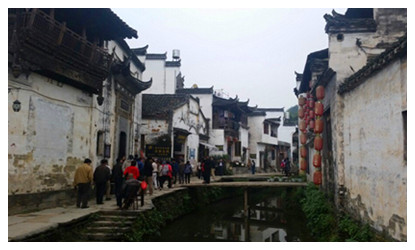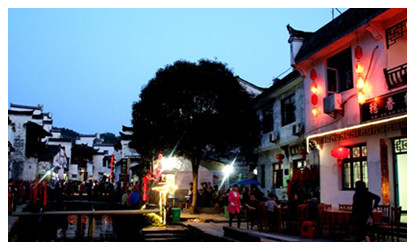Likeng Ancient Village
History of Likeng Village
From Song Dynasty to Qing Dynasty (960-1911), there were more than one hundred talented people in this village. Among them, 32 people were civil and military officials. They wrote 29 famous books. When they achieved success and won recognition, most of them chose to construct their hometown. So they not only built their own exquisite and grand house, but also built 12 ancestral halls, 17 temples, pavilions and bridges. In ancient time, the village was reputed as the most flourishing village of the east Wuyuan.
What to see?
In the village, ancient buildings and exquisite wood carvings of Ming and Qing Dynasties (1368-1911) show the cultural relics and deep historical heritages of the area. Ancient buildings and farm houses belong to the Huizhou style of architecture. This style can be regarded as a unique genre in Chinese architecture history.
 Zhongshu Bridge is located in the entrance gate of the village. With a height of 3 meters and a length of 4 meters, it was built in 1109 during the Northern Song Dynasty, and nowadays connects a river and this village. Likeng Archway is behind Zhongshu bridge. The top of it is inscribed with two Chinese characters “Li Keng”.
Zhongshu Bridge is located in the entrance gate of the village. With a height of 3 meters and a length of 4 meters, it was built in 1109 during the Northern Song Dynasty, and nowadays connects a river and this village. Likeng Archway is behind Zhongshu bridge. The top of it is inscribed with two Chinese characters “Li Keng”.
Wenchang Pavilion is an embodiment of local cultural relics. Passing through the archway, one arrives at Wenchang Pavilion and a praying temple. The pavilion With three storeys, it contains many rare paintings and calligraphies of Ming and Qing Dynasties. The temple is considered a happiness temple that also attracts tourists. Local people strongly believe that the growth of this village benefits from this temple.
The Inner Village is quite different. All the houses are painted white. The cyan roofs are decorated with abundant and exquisite wooden carvings. Small paths are covered with blue stones. Limpid streams meander between these ancient buildings. This kind of beautiful natural scenery and distinctive local characteristics reflect and complement each other. This combination is just like a Chinese ink painting. Visitors enjoy a peaceful and quiet feeling when they walk on the paths between the houses.
 Scholar-Bureaucrat Manor, a main building in the typical style, is an ancient private house. It is said that the house keeper became the fifth title of Chinese officers after he earned a lot of money. He built this house in order to mark his successful career. Walking further, there are many shops along both sides of the path. Many ingenious handcrafts and abundant local products attract visitors’ eyes.
Scholar-Bureaucrat Manor, a main building in the typical style, is an ancient private house. It is said that the house keeper became the fifth title of Chinese officers after he earned a lot of money. He built this house in order to mark his successful career. Walking further, there are many shops along both sides of the path. Many ingenious handcrafts and abundant local products attract visitors’ eyes.
Shenming Pavilion is located to the east of Scholar-Bureaucrat Manor. The literal meaning of “Shenming” is to seek justice and wise judgments. In ancient times, people came together in this palace in order to discuss some puzzling and complicated problems. They expressed their own statements in order to provoke others. Most decisions and judgments promoted by ordinary people in this pavilion were wise and useful. This pavilion is just like a symbol of the wisdom of ordinary people. Nowadays, tourists often like sitting in the pavilion, and imagining the scene of people all vying with each other in airing their views.
Li Zhicheng's Former Residence, located in the easternmost part of this village, is the most famous scenic spot in the village that is well worth visiting. Li Zhicheng was the martial arts scholar in Southern Song Dynasty (960 - 1127). Visitors can enter this residence and appreciate exquisite decorations at the close range. In the innermost part of the residence, there is a unique garden with an 800 year old Crape Myrtle tree. This tree still produces blossom with a 90-day florescence. Visitors appreciate the beauty of this old tree. Touring around this residence, people will feel a glorious, rich scholarly atmosphere and enjoy themselves so much that they won’t want to leave.
Likeng Food & Specialty
After touring around the village, eating a delicious meal is very enjoyable here. There are many delicious foods with local characteristics that attract tourists, such as Steamed Carp, Flower Mushroom Chukar and Tradtional Roast Meat. Each of these dishes has abundant ingredients and complex cooking steps. Especially for the roast meat, the cook will put the streaky pork into a unique sauce, then put the pork on the fire until the meat is charred outside and tender inside. Tourists are always impressed by this dish.
Travel Tips
Add: at the east of Wuyuan, about 12 kilometers from Wuyuan County, Shangrao City,Jiangxi Province
Entrance Fees: CNY 60
Opening Hours: 08:00 -18:00 (March to November) , 8:00 - 17:30 (December to February)







 Ask Questions ?
Ask Questions ?